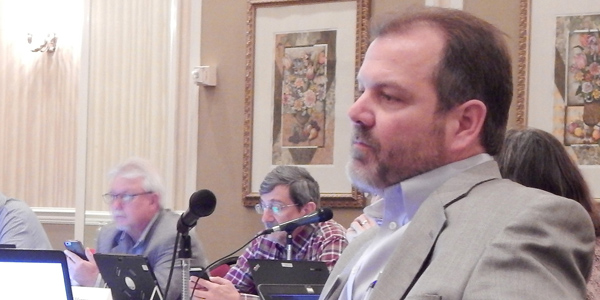By Tom Kleckner
DALLAS — SPP stakeholders last week spent the remains of a meeting cut short by weather-related travel problems discussing staff and member solutions to the RTO’s Z2 crediting process.

In the end, the Z2 Task Force came no closer to a solution to the albatross and decided to schedule monthly meetings in an effort to reach an April deadline for recommending improvements.
The task force was established last August and had hoped to present its findings to the Board of Directors and Markets and Operations Policy Committee in January or April of this year.
“We knew six months was aggressive,” said Bruce Rew, SPP’s vice president of operations and the group’s staff secretary.
Stakeholders drilled down into two of the six options first presented by SPP staff in November: “reverse engineering” of the Z2 process and using incremental long-term congestion rights (ILTCRs). (See Z2 Task Force Looks at Incremental Congestion Rights.)
The task force also reviewed a proposal from Westar Energy that suggested modifying SPP’s generator interconnection process and transmission service requests and incorporating financial hedging instruments. Westar also proposed revising the Tariff so that any proposed sponsored projects would be studied for inclusion in the planning process and possible selection for Tariff funding.
That suggestion did not seem to gain much traction with stakeholders.
Grant pointed out that Westar’s plan would result in a separate process to secure annual revenue rights or transmission congestion rights. “I want to get back to being simple and not doing anything more than we need to do, because that’s what got us into trouble,” he said.
Under the SPP Tariff’s Attachment Z2, staff is responsible for assigning members financial credits and obligations for sponsored upgrades. However, staff had not applied the credits for years dating back to 2008, complicating the task of trying to accurately compensate project sponsors and claw back money from members who owed debts for the upgrades.
Kansas City Power & Light’s Denise Buffington, who chairs the task force, noted that each discussion on Z2 unearths new information previously unknown to the group.
“We’re still trying to figure out what the universe looks like, and how to rate it,” she said last week.
Staff’s reverse-engineering proposal would remove short-term TCRs (less than one year) from the crediting process, although short-term revenues have declined substantially since the start of SPP’s Integrated Marketplace. A second proposal over the long term would implement a standard credit payment rate for all creditable impacts, including both network and point-to-point reservations, should the Z2 process be terminated.

SPP also suggested using its current ILTCR process as a cost-recovery mechanism for upgrades with directly assigned upgrade costs (DAUC). To be eligible for the ILTCRs and megawatt capacities, upgrades would have to be sponsored with DAUC, create additional available transfer capability on a specific path and be the outcome of a study request.
“With Z2 credits, there’s no question whether or not they’re given,” said NextEra Energy Resources’ Aundrea Williams. “With ILTCRs, there’s no certainty they’ll be awarded. Z2 is the byproduct of a formula. There’s still a possibility of not getting them as part of the auction. You would have to look at the overall pool of who gets what and what’s eligible for a” generator interconnection.
Oklahoma Gas and Electric’s Greg McAuley suggested another option: not completely disregarding the “do-nothing option.”
“I don’t like Z2 either, but if there’s enough confusion with these [proposals], I still think there’s a problem,” he said. “It’s like the devil you know. We know this devil, and until we’re sure that we have a viable option that isn’t just as complex, or more so, we shouldn’t dismiss the do-nothing option out of hand.”




